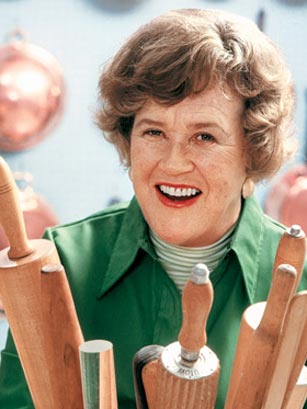
There was a time when "French" was not an insult in the U.S. After World War II, many Americans went to Europe and had meals that would change their lives. Julia Child was one of them. Visiting Rouen with her husband in 1948, she had a lunch of oysters and sole meunire that, she recalled, "I never got over." Neither, in a way, did any of us. She enrolled in cooking school, and with two colleagues wrote the two-volume opus Mastering the Art of French Cooking. In 1963, she brought her philosophy to the masses with her public-TV show, The French Chef. To a U.S. enamored of canned string beans and TV dinners, her lessons were a revelation: fresh food tastes better, and you don't have to be a chef to cook and eat well. It was her personality as much as her expertise that popularized her message. At 6-ft. 2-in., she was a natural ham, and she handled her on-camera missteps so cheerfully that she persuaded a generation of viewers that they could do anything she could. She was unpretentious without ever dumbing down her subject, and her longevity was the best answer to the dietary absolutists convinced that a little butter will kill you. Perhaps it will, but so, in the end, will life. Child, who lived to 91, had her fill of both.